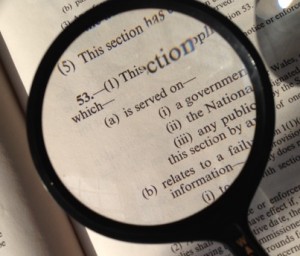FOIMan thinks it may be too soon to start celebrating yesterday’s ruling by the Court of Appeal that Prince Charles’ letters to Ministers should be disclosed, but argues that interpretation of European law may yet prove crucial in this case and for others.

Yesterday’s judgment by the Court of Appeal, apparently overturning the use of the section 53 veto for the first time, was immediately welcomed by FOI campaigners, supporters and of course, journalists. And it is a victory – for now – for Rob Evans of the Guardian who has pursued the disclosure of letters from Prince Charles to Government ministers for 9 years.
Personally I would be very happy if this decision stuck. The ability of Ministers to overturn the considered decisions of the Information Commissioner, information tribunals, and ultimately the courts, is in my view as well as the Lord Chief Justice’s “a constitutional aberration” (para 2). But…I can’t help feeling that this decision is not the end of the road on this case.
Firstly, that’s a matter of fact. The Attorney General has been granted leave to appeal to the Supreme Court. And he’s already indicated that he intends to.
Secondly, as Jon Baines has already pointed out, the decision in relation to FOI seems at odds with the intention of Parliament. The reason for the veto was to allow ministers to overturn FOI decisions that they didn’t like. That was why the government of the day proposed the veto, and that was what Parliament voted for. That in the end was what Charles’ own mum gave assent to. The Master of the Rolls says that s.53 is “a remarkable provision”,
“because it seriously undermines the efficacy of the rights of appeal accorded by sections 57 and 58 of the FOIA.” (para. 39)
To which the answer is, well, yes, that was the point. Jack Straw, the Home Secretary who was responsible for taking FOIA through Parliament, told the Justice Select Committee (para 169) two years ago:
“Without the veto, we would have dropped the Bill. We had to have some backstop to protect Government.”
In its report at the conclusion of the post-legislative scrutiny, the Committee appeared to fully support the use of the veto in this way, and indeed suggested that its use ought not to be considered “exceptional”.
So my hunch – and I hope I’m wrong – is that the decision in relation to FOI will be overturned by the Supreme Court. Even if it isn’t, I could easily see an amendment to FOIA being passed with little opposition whatever party is in power to plug the gap. Celebrations of the death of the FOIA veto are likely to be short-lived.
However, I don’t think it’s all doom and gloom from this end of the bar. The Court of Appeal also ruled that the application of the veto to environmental information was unlawful. That seems to me a much stronger argument. The Environmental Information Regulations 2004 (EIR) are the UK government’s implementation of a European Union Directive. Article 6 of the Directive requires that:
“Member States shall ensure that an applicant has access to a review procedure before a court of law or another independent and impartial body established by law, in which the acts or omissions of the public authority concerned can be reviewed and whose decisions may become final…”
It is hard to see how the veto is compatible with that. And there would be little the government could do to change the law, short of leaving Europe altogether (which of course is possible but not in the immediate future).
The implications of that are several. First, many of Prince Charles’ letters apparently related to environmental issues, so if the Supreme Court quashes the Court of Appeal’s ruling on the FOI veto but upholds the ruling on EIR, then there may still be a significant disclosure of correspondence in this case. Second, there will be implications for another veto decision. Only at the end of January, the Transport Secretary vetoed the disclosure of a report on HS2. The report was viewed to constitute environmental information, so it is likely that if the Supreme Court upholds the Court of Appeal’s position on the veto and EIR, then that decision will be viewed as unlawful as well. Thirdly, it reinforces the already strong impression that EIR can be more effective at achieving disclosure than FOI (though of course this is only useful if you want to access environmental information – but that’s an increasingly broad spectrum of information thanks to case law).
Even in respect of my primary argument above, there is hope if the Supreme Court agrees that the veto is incompatible with European law. It was successfully argued in the Court of Appeal (paras 74-80) that the Attorney General had failed to consider in his certificate how the public interest in disclosure of non-environmental information would be affected if the environmental information had to be disclosed. If the Supreme Court does order the disclosure of the environmental information, it may therefore decide that the Attorney General’s veto certificate is flawed more generally – and rule that the rest of the letters must be disclosed as a result.
We’ll have to wait and see what the Supreme Court decides, so we have yet to hear the fat lady finish her scales let alone receive the rapturous applause of a satisfied audience. And as this particular battle for correspondence has so far taken 9 years, it appears a somewhat extreme example of the point I made in my last post. Getting access to correspondence is unlikely to be an easy – or quick – exercise.


Worth noting that leaving the EU would not be sufficient to avoid EIR. The UK would also have revoke is ratification of the Aarhus Convention whose obligations are partially satisfied via the EU directives.
Those obligations would continue in force as long as the Aarhus Convention was in force in the UK.